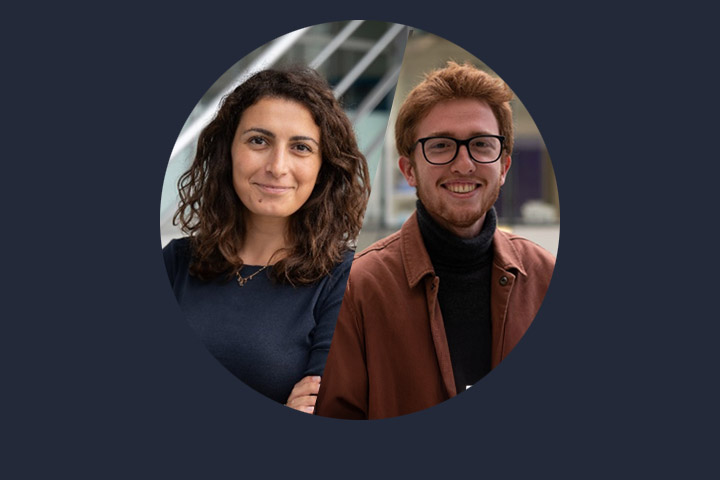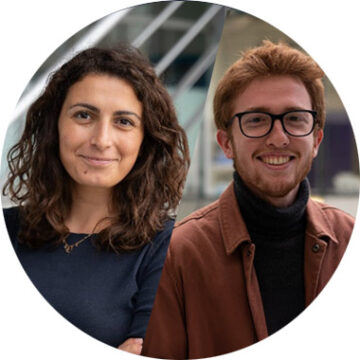
Interview of two former instructors at the Workshop “Introduction to Experimental Neuroscience”
 Ourania Semelidou, post-doctoral fellow at Neurocentre Magendie, and Simon Lecomte, PhD student at IINS, tell us about their experience as instructors in the 2023 and 2024 editions of the workshop.
Ourania Semelidou, post-doctoral fellow at Neurocentre Magendie, and Simon Lecomte, PhD student at IINS, tell us about their experience as instructors in the 2023 and 2024 editions of the workshop.
The call for instructors is about to open
First, can you tell us about your background?
Ourania Semelidou: Originally from Greece, I moved to France four years ago as a postdoctoral fellow in the team of Andreas Frick. With an academic background in neuroscience, my research delves into the neurobiological mechanisms of sensory perception and how they change in neurodevelopmental and psychiatric disorders.
Simon Lecomte: I started my academic path with a Bachelor’s degree in Psychology at the University of Strasbourg, where I developed a strong interest in neuroscience. During my time there, I completed two internships that shaped my early scientific experience. The first focused on chronic pain and morphine withdrawal in mice, which introduced me to animal models and the physiological underpinnings of pain. The second internship was in chrono-neurobiology, where I explored how biological rhythms impact brain function. These experiences deepened my interest in neuroscience and led me to pursue further studies in the field. I then moved to Bordeaux to join the International Master of Neuroscience program. During this time, I completed two internships at the Neurocentre Magendie, both centered on astrocytes in the hippocampus, a brain area critical for learning and memory.
Currently, I am pursuing my PhD under the guidance of Christophe Mulle at IINS in Bordeaux. My project focuses on the impact of FMRP deletion on presynaptic mechanisms at DG-CA3 synapses. This work builds on my passion for synaptic biology and neural circuits, with an emphasis on understanding how Fragile X Syndrome influences synaptic transmission.
How did you learn about the workshop?
SL: I heard about the workshop from my thesis supervisor, Christophe Mulle, who also directs the Bordeaux School of Neuroscience where the event is held. He encouraged me to apply, knowing that this experience would align well with my career aspirations. Given my long-term goal of becoming a university professor, combining research and teaching, this seemed like a perfect opportunity to hone my skills in both areas.
OS: I learned about the workshop through communication from the Bordeaux Neurocampus.
Why did you apply?
OS: The objectives of the workshop align with my commitment to teaching and mentoring students. I find it particularly engaging to introduce students to my project and the techniques I employ, while also potentially assisting them with their future endeavours. In addition, it’s a nice challenge to plan a project and ensure that everyone understands the background while trying out new techniques in just one week! In the second year (2024), I volunteered again alongside a PhD student ([en] Nikolett Zsigri) to share the experience.
SL: I applied because I saw this as a great opportunity to show the experimental technique I use regularly in my PhD work: patch-clamp electrophysiology in acute slices. Teaching such a complex procedure is crucial for any future academic, and as someone who aspires to balance both research and teaching, I knew this workshop would be an excellent occasion to develop those skills. The workshop also offered me the opportunity to contribute to the education of future neuroscientists, which is a role I see myself taking on in the long term.
Can you describe your 1-week project in few sentences? How much work was it to prepare and run?
OS: Based in Bordeaux, I had the opportunity to build a project focused on perceptual decision-making and its neural underpinnings in autism. The goal of the project was to enhance students’ understanding of perceptual alterations in autism, to teach them how to perform lens implantation surgeries, and how to conduct and analyse a perceptual decision-making task alongside two-photon microscopy. The organization of the project was facilitated by the workshop staff. They were always available to assist and ensured that everything was in place when the project began, saving us from any last-minute stress!
SL: My project involved demonstrating patch-clamp electrophysiology technique to explore how dopamine influences the excitability of granule cells in the hippocampus. This research is particularly relevant to understanding how neuromodulators impact neural circuits involved in memory. Preparing for this workshop involved careful planning, from managing all the solutions needed to the cutting of brain slices with the students. It also required organizing my teaching speech in a way that would make complex ideas accessible to students, which took some effort but was ultimately a great learning experience for me as well.
Was it your first time teaching?
SL: Yes, this was my first formal teaching experience. While I’ve helped colleagues in the lab before, leading a group through an entire experimental protocol was a new challenge for me. It also gave me a sense of how much I enjoy teaching and mentoring, reinforcing my desire to pursue a career that involves both research and education.
OS: No, this wasn’t my first time, but teaching always needs to adapt to the students’ needs and backgrounds. Being an instructor for a group of students with diverse experiences, while keeping everyone engaged and motivated, was a very rewarding experience.
What was it like being an instructor?
OS: I enjoyed it very much. I was excited to share the project with the students, although a bit concerned that their energy might drop during the second week of the school. However, everyone remained highly motivated, the project went smoothly, and the students did a great job!
SL: Initially, I did feel some pressure, knowing I was responsible for communicating intricate details of a technique to students. However, as the session progressed, I became more comfortable, and the experience turned out to be incredibly rewarding. The students were enthusiastic and engaged, which made the atmosphere collaborative rather than stressful. One memorable moment was when one of the students, after some trial and error, successfully achieved their first patch-clamp recording. That shared excitement reminded me of why I want to teach as part of my future academic career.
What did this experience bring you for your everyday work, for your long-term goals?
SL: This experience had a lasting impact on how I approach both my research and my teaching. On the research side, breaking down complex concepts for others has deepened my own understanding of the work I do. In terms of my long-term goals, it reaffirmed my desire to pursue a career in academia where I can combine both teaching and research. The ability to effectively mentor students is an essential skill for any professor, and this workshop was a great first step in developing that ability.
OS: Being an instructor in this workshop strengthened my commitment to mentoring and helped me to better engage with students, adapting my approach to meet their needs. It also gave me the opportunity to connect with students and instructors from around the world and learn more about their work and interests. In the long term, this experience motivated me to participate in initiatives that aim to inspire the next generation of scientists and help them discover what truly excites them about neuroscience. I would totally recommend participating as an instructor!
SL: Me as well!!!
Last update 07/03/25
